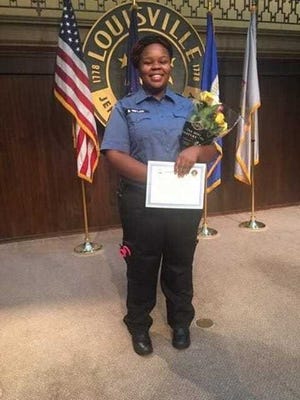POLICING THE USA
Benjamin Crump: When will African Americans have the right to self defense?
Breonna Taylor's boyfriend tried to stand his ground, but got charged with a crime instead.
Ben Crump
In America, we like to believe that the rights afforded under the Constitution and by law apply equally to everyone. But several recent, high-profile cases starkly document how justice in America is apportioned in black and white.
We know that black people are more likely to be stopped and more likely to be perceived as dangerous just by being. It has come to be known as doing something “while black” — walking while black, shopping while black, driving while black and now even bird-watching while black.
If it’s this difficult for black people to just be, imagine the barriers that prevent us from actually defending ourselves.
This raises some difficult but important questions:
Can black Americans exercise their Second Amendment right to bear arms? Can they stand their ground? Can they claim self-defense in shooting someone who threatens them with physical harm? Does the castle doctrine, which grants a person the right to use deadly force to protect their home from an intruder, apply to them?
COLUMN:Video of George Floyd pinned by Minneapolis cops is shocking but not surprising
Look no further than the cases of Ahmaud Arbery and Breonna Taylor for your answers.
In February, Arbery was jogging when he was chased down by two white men in a truck and shot to death. The alleged killers claimed they feared for their lives despite Arbery being unarmed — and the police took them at their word. If a white person says they feel threatened by a black person, no further evidence is required. Any level of force seems to be justified.

Only after the case made national news when a video of the shocking killing surfaced months later were suspects Gregory McMichael and Travis McMichael finally arrested and charged with murder.
Contrast the treatment of the McMichaels' with that of Kenneth Walker, a black man who fired one nonfatal round from a legally registered firearm against armed intruders in the middle of the night. Walker was defending his castle and his woman when police burst into his apartment unannounced on a misdirected drug raid.
COLUMN:In coronavirus crisis, lessons in humanity toward America's incarcerated
Just before 1 a.m. on March 13, Walker was asleep alongside his girlfriend, Breonna Taylor, a 26-year-old EMT and hero in the COVID-19 pandemic, who daily put her life on the line to help others. Three plainclothes Louisville Metro Police officers stormed into Taylor’s apartment on a “no-knock warrant.” Walker called 911, grabbed his gun and fired a single shot.
After an officer was hit in the leg, police opened fire, spraying more than 20 bullets. Taylor, who was shot at least eight times, died. Walker was charged with attempted murder of a police officer. And unlike what happened to the McMichaels, it didn't take months for authorities to press charges. Walker was charged immediately. The charges were dropped only after months of advocacy and national media attention.
The police were looking for narcotics but didn’t find any. The suspect they were seeking was already in custody. Walker was a licensed gun owner who thought someone was breaking in. Clearly, he felt threatened. Where was his right to self-defense?
Recently, the Louisville Metro Police Department said it’s updating policies regarding no-knock warrants and body cameras in the wake of Taylor’s death. The changes will provide an “added level of scrutiny’’ for approval of no-knock warrants and require officers to wear cameras when serving warrants or in situations where they identify themselves as police officers.
That’s helpful, but it doesn’t get to the root problem — that we have two vastly different systems of justice in this country depending on whether you’re black or white. I’ve seen the pain firsthand because I represent the families of both Arbery and Taylor.
Would their stories have ended differently if Ahmaud were a white jogger and Walker were a white man defending a white woman asleep at his side?
It’s 2020 — well past time to surrender our implicit biases and ensure that black Americans are guaranteed the same right to self-defense as white Americans. Justice should be blind, not dependent on the color of the finger that pulled the trigger.
Ben Crump is a civil rights attorney and founder of the national law firm Ben Crump Law, based in Tallahassee, Florida.
No comments:
Post a Comment